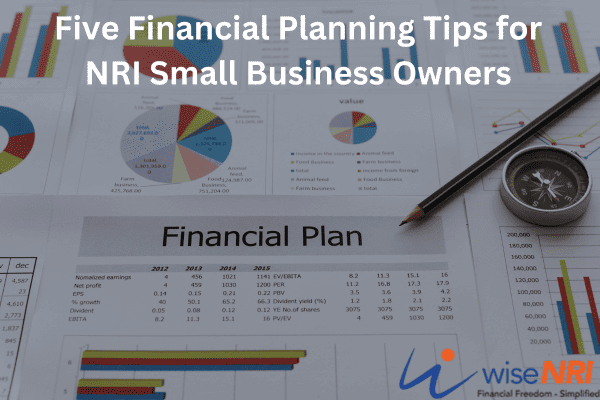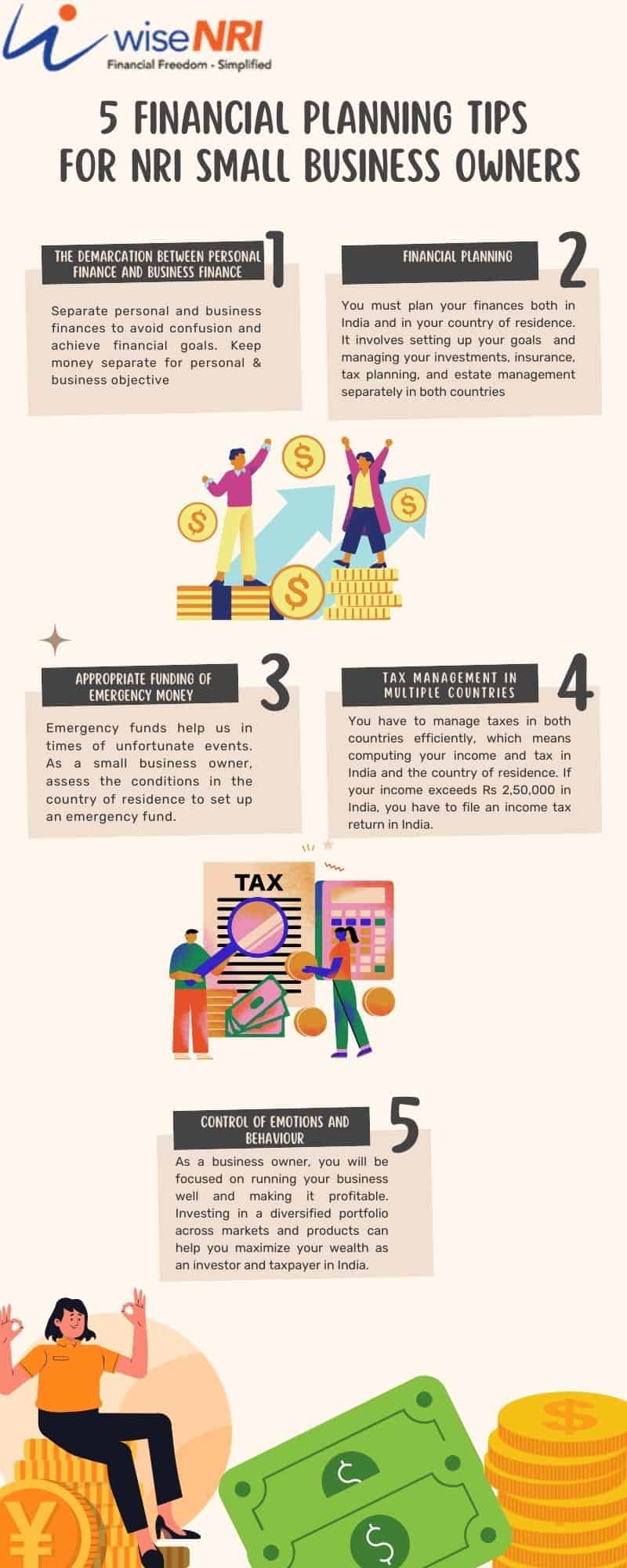Are you an NRI small business owner looking to secure your financial future? We’ve got you covered! In this blog post, we’ll share five essential financial planning tips specifically tailored to meet the unique needs of NRI entrepreneurs like yourself.
Electricity tariffs were 8 percent higher in Q3 2022 vis-a-vis Q3 2021 in Singapore. With rising costs of rent and energy, small businesses faced increasing cost pressures. Per the MetLife and U.S. Chamber of Commerce Small Business Index, in September 2022, 83 percent of business owners in the United States of America said that rising prices had had a significant impact on their business.

Must Read- 9 Benefits of Early Financial Planning for NRIs
Small business owners do not have some of the benefits that many people with regular salaries have, like a steady monthly income, insurance coverage, paid leaves, etc. Therefore, apart from managing business finances, they also need to take care of personal finances. And when business conditions are tough, managing personal finances is even more challenging. NRI business owners have to be aware of more factors across countries. Their business and personal finances can be affected differently due to socio-economic factors compared to people with financial interests only in one country.
5 Financial Planning Tips for NRI Small Business Owners
Let us see how NRI business owners can plan their finances so that they can maximize the impact of positive factors and reduce the effects of negative socio-economic factors on their finances –
1. The Demarcation Between Personal Finance and Business Finance
The lines between personal money and business money can get blurred. While you will use the money earned from your business to achieve your financial goals, it is crucial to keep the finances separate. The money to be used for personal purposes and business objectives have to be kept separate so that you don’t end up using the money for your child’s education to launch a new product or vice-versa.
The best way to do that is to set up short-term and long-term goals for your business and personal life and then decide on a course of action on how you would fund the goals etc.
2. Financial Planning
You must plan your finances both in India and in your country of residence. It involves setting up your goals and managing NRI investment options, insurance, tax planning, and estate management separately in both countries. It will depend on your plans for the future as well. For example, if you live in the United Kingdom and plan to retire there, you will most likely be eligible for a pension if you have contributed to national insurance for ten years or more. If you want to retire in India, you must decide on staying options, retirement funds, etc. If you do not have a house in India, you will have to rent a property or buy one. Buying a property is a complex process, even more so for NRIs. Many steps and exhaustive documentation are involved, and it requires time, effort, and money.

Must Check – Financial Planning in Forties
You will have to manage your estate in both countries. Decide on the succession plans of the business. Will you turn the reins of the business over to the next leader, sell it or shut down the business? And plan accordingly. The proceeds of selling or shutting the business have to be managed well so that tax is optimized and you can make the best use of them to have a comfortable lifestyle post-retirement.
Read – Will AI destroy all dreams of NRIs
3. Appropriate Funding of Emergency Money
Emergency funds help us in times of unfortunate events. As a small business owner, assess the conditions in the country of residence to set up an emergency fund. For example, in the United Kingdom, the government usually takes care of most healthcare costs, and it may not make sense to lock in a significant amount. But in India, you will have to spend money on healthcare for yourself and your loved ones. Good medical facilities are expensive too. Therefore, ensure you have about 3 to 6 months of income as emergency funds. Invest the money in a liquid asset that is more lucrative than a savings bank account such that you earn returns and can redeem the cash easily.
4. Tax Management in Multiple Countries
You have to manage taxes in both countries efficiently, which means computing your income and tax in India and the country of residence. If your income exceeds Rs 2,50,000 in India, you have to file an income tax return in India. Here are a few essential points to consider while filing taxes –
- Incomes earned outside India will not be taxable in India under the Double Taxation Avoidance Agreement (DTAA).
- Interest earned by the NRI on Non-Resident External (NRE) accounts and Foreign Currency Non-Repatriable (FCNR) accounts is also not taxable in India.
- Income from a house property situated in India, capital gains on transfer of asset situated in India, income from fixed deposits, and interest on a savings bank account is considered income earned or accrued in India. These incomes are taxable for an NRI.

Must Read- Financial Planning For NRI
5. Control of Emotions and Behaviour
As a business owner, you will be focused on running your business well and making it profitable. Investing in a diversified portfolio across markets and products can help you maximize your wealth as an investor and taxpayer in India. You will also have to manage your investment portfolio in the country of residence to generate capital growth and optimum returns. You might face various situations like a business downturn, unexpected increase in profitability, volatility in different markets at different times, changes in taxation rules, etc. It is not easy to manage everything simultaneously. The best way is to understand the factors that can and cannot be controlled. For example, you cannot control a stock market downturn but can be conscious of your spending. Once you recognize the difference between controllable and uncontrollable factors, you can make rational decisions. Being disciplined with your budget and regularly investing is a prudent way to grow your money and wealth. Following cost-conscious measures, constantly skilling yourself, and being tuned to the market will help you manage your business income well.
Being proactive is the key to long-term success in both personal and business finances. Set realistic goals, make plans to achieve them, execute them, and review plans and actions regularly to ensure financial success in both personal and business finances.
We have experience investing money and understand the nuances of financial planning for NRIs. Click here to connect with us to find out more.

My wife and myself uk british citizen over 50 years. unfortunatelly wife fell and fractured spine. Now we decided to retire in India with our relations. We do not trust INDIAN BANKS. We want sterling in an offshoe and draw as we require INR in india . can you help